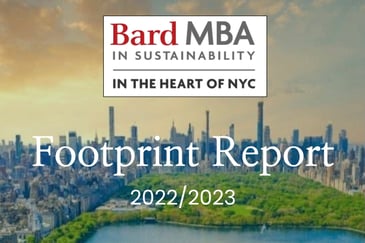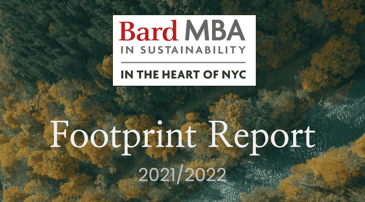Announcing the 2023/2024 Bard MBA ESG Report

The student-run ESG Committee, previously known as the Footprint Committee, is excited to present the 2023/2024 Annual ESG Report.
Key Updates:
- Transition from Footprint Report to ESG Report
This year, our committee made a significant shift from our traditional Footprint Report to a comprehensive ESG (Environmental, Social, and Governance) Report. This change aligns with broader trends in the business community, allowing us to better capture the full spectrum of our program's impact.
While the report still includes the emissions calculations that were the focus of previous Footprint Reports, this data is now part of the “E” (Environmental) section of the ESG Report. This remains the largest and most detailed section, continuing to represent the core work of the student ESG Committee.
In addition to the environmental data, the report now includes sections on Social and Governance. The Social section builds on previous efforts to highlight our program's commitment to Justice, Equity, Diversity, and Inclusion (JEDI), continuing to expand reporting on this crucial work. The Governance section sheds light on the interactions between student committees, administration, and the student body, fostering greater transparency.
- Consolidated Reporting
This year, we’ve also focused on enhancing the readability of the Environment section by consolidating findings across its subsections. As a result, even with the inclusion of new Social and Governance sections, the overall length of the report has been reduced by approximately 10 pages, making it more accessible and easier to digest.
Highlighted Results:
The environmental section covers key areas including Transportation, Accommodations, Food, Buildings, Data, Waste, and Books. This year, the program’s total emissions amounted to 159.68 MT CO2e, marking a 6.19% increase from the previous year. This rise is largely due to more comprehensive data collection in the Food section. As in previous years, Transportation remains the largest contributor, accounting for 72.8% of total emissions.
Our 13-member student ESG Committee is proud to share this report with you. We hope you’ll take the time to explore it. We are dedicated to continuously improving our reporting processes and making meaningful recommendations that will reduce our environmental impact and enhance the student experience year after year..png?width=612&height=50&name=Email%20Headers%20(1).png)
ESG Committee members were responsible for every part of the process from survey design to methodology, to data analysis/visualization and interpretation. The skill-set acquired through participation is real-world experience that will be transferable to many of the sustainability roles that students will take on in their careers.



